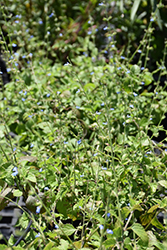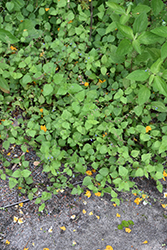It's all about ...
plants

Plant Height: 6 inches
Flower Height: 10 inches
Spacing: 4 feet
Sunlight:
![]()
![]()
![]()
Hardiness Zone: 9a
Other Names: Creeping Sage, Tropical Sage, syn. Salvia riparia
Description:
A spreading, trailing plant that tolerates moist to dry sandy soil, and shade to full sun; noted for attractive foliage and tiny sky blue flowers that are fragrant; best when massed in woodland landscape as an attractive groundcover; attracts pollinators
Ornamental Features
Southern River Sage features delicate spikes of fragrant sky blue flowers rising above the foliage from mid spring to mid fall. Its attractive small serrated oval leaves remain green in colour throughout the year.
Landscape Attributes
Southern River Sage is a dense herbaceous evergreen perennial with a ground-hugging habit of growth. Its relatively coarse texture can be used to stand it apart from other garden plants with finer foliage.
This plant will require occasional maintenance and upkeep, and is best cleaned up in early spring before it resumes active growth for the season. It is a good choice for attracting bees and butterflies to your yard, but is not particularly attractive to deer who tend to leave it alone in favor of tastier treats. Gardeners should be aware of the following characteristic(s) that may warrant special consideration;
- Spreading
- Self-Seeding
Southern River Sage is recommended for the following landscape applications;
- Mass Planting
- General Garden Use
- Groundcover
- Naturalizing And Woodland Gardens
Planting & Growing
Southern River Sage will grow to be only 6 inches tall at maturity extending to 10 inches tall with the flowers, with a spread of 5 feet. When grown in masses or used as a bedding plant, individual plants should be spaced approximately 4 feet apart. Its foliage tends to remain low and dense right to the ground. It grows at a fast rate, and under ideal conditions can be expected to live for approximately 3 years. As an evegreen perennial, this plant will typically keep its form and foliage year-round.
This plant performs well in both full sun and full shade. It is very adaptable to both dry and moist growing conditions, but will not tolerate any standing water. It is considered to be drought-tolerant, and thus makes an ideal choice for a low-water garden or xeriscape application. This plant should not require much in the way of fertilizing once established, although it may appreciate a shot of general-purpose fertilizer from time to time early in the growing season. It is not particular as to soil pH, but grows best in sandy soils. It is somewhat tolerant of urban pollution. This species is native to parts of North America. It can be propagated by division.
This plant is not reliably hardy in our region, and certain restrictions may apply; contact the store for more information.

